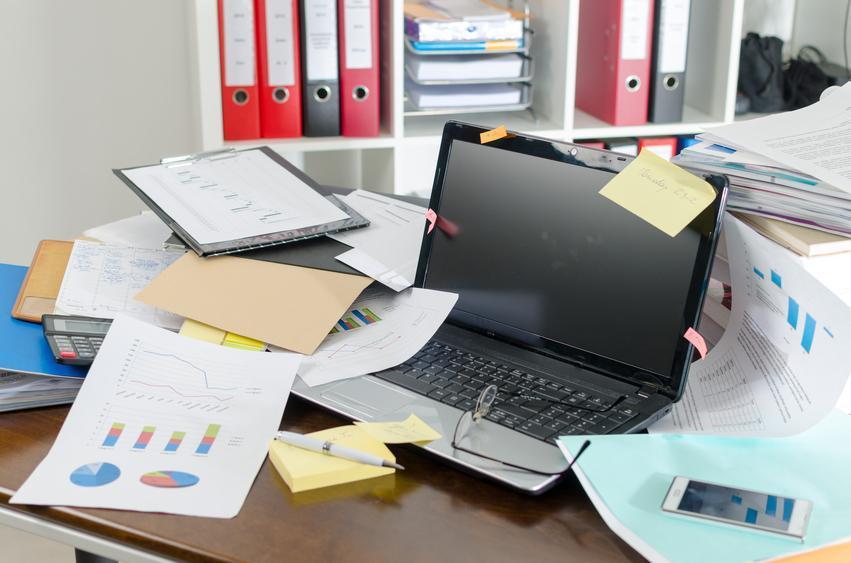A little upfront work can save you a lot of time.
This is a guest post from Solo PR PRO Premium member, Daria Steigman.
Every time I get a new computer – desktop, laptop, or All-in-One – I have visions of reclaiming my desk and basking in the openness of white space. The reality, of course, is usually a fresh jumble of cables, hubs, and wires underfoot—not to mention multiple charging devices, Post-It notes, and at least two steno pads on my desk.
Now, to be fair, I am generally very organized. Business card data get transferred to Google Contacts, and my email and calendar are color coordinated by category (clients, biz dev, financials, etc.). I use Wunderlist to keep track of client tasks, blog posts ideas, and follows-up-with prospects. Project papers are in well-marked files, and I can quickly put my hands on all my important client papers. But sometimes my desk, worktable, and floor surfaces still take on a life of their own.
Yes, work can get very busy—but the chaos always affects my efficiency.
I know I’m not alone. Recognizing I’m not the only Solo PR pro who temporarily sacrifices order at the altar of expediency, I reached out a while ago to Susan Kousek, principal of Balanced Spaces, for some advice on getting organized. Kousek, who is a member of the National Association of Professional Organizers, offered the following tips. I have implemented many of them – and it’s made all the difference.
- Think Vertically—“It’s a lot easier to find papers when they are stacked vertically, not horizontally,” said Kousek. She’s a big fan of desktop file bins because they allow you to see what files you have. She also recommends keeping a supply of file folders on hand so you can create new folders as needed.
- Buy a Label Maker—My label maker is probably my single best organizational tool. Instead of thumbing through folders marked with scribbled client and project names, I now look across a sea of neatly printed labels in the rolling file folder next to my desk. Simple, but very effective.
- Use a Stapler—When you print off long articles from a Web site, or print out client documents, the individual papers can quickly get mixed up. “If you staple something right away,” said Kousek, “the pages become one piece of paper rather than five or six.” This makes it a lot easier to find the document you’re looking for in a large stack of papers.
- Make Lists—“Making lists is critical,” said Kousek, who uses a small, yellow notepad to jot down everything she needs to do the next day. The list then rests on her keyboard overnight so she can’t miss it in the morning. “I find that I work faster because I can look at the list and see how much I need to do,” she said. “Without the list, I just react to whatever email or phone call comes in, or to whatever is on top of the stack of papers.” I use a combination of Wunderlist and a notepad – and, yes, I’ve also been known to stick a Post-It note to my monitor late at night so I don’t forget to close the loop on something I’d forgotten to add to my lists. (Hey, it’s not a perfect system.)
- Consider a “Today” File—A daily to-do file gives you a place to pull together all the papers you will need for the next day. I don’t use this, but I’ve heard others swear by it as a way to stay on track.
- Divide Your Office into Zones—“While some people are comforted by clutter, it’s very hard for most people to focus with papers all over the desk,” said Kousek. She recommends that people create different zones in their office, reserving their desktop for only their important papers. Designate a separate place in the office to stack up mail and papers that you want to keep but aren’t going to either read or file right away.
- Clear Your Desk at Day’s End—Even if you start with a clean desk, you are inevitably going to end up with papers all over it. Kousek suggested that everyone take a few minutes at the end of the day to put papers back into file folders (and put the folders away) and create new file folders for new materials. Said Kousek, “Even though it takes some time now, it will save you time in the long run. It really makes a difference.”
I’m still very busy—but putting these suggestions into practice has certainly helped. I’m going to do my best to stay organized, at least for a little while.
You can find Daria Steigman at Steigman Communications, llc. A version of this post first ran as part of her Independent Thinking series for IABC.com.


0 Comments